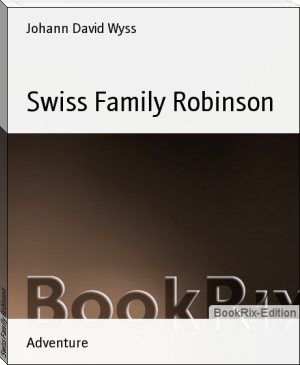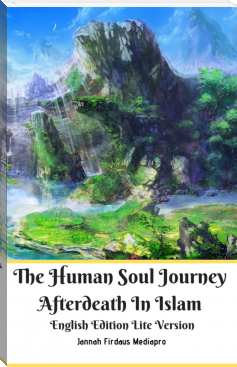Swiss Family Robinson - Johann David Wyss (poetry books to read txt) 📗

- Author: Johann David Wyss
- Performer: -
Book online «Swiss Family Robinson - Johann David Wyss (poetry books to read txt) 📗». Author Johann David Wyss
continually changing, as they flew, from beautiful rose to pure white,
as alternately their snowy wings and rosy breasts were visible.
One of those which fell was perfectly dead, but the other appeared only
slightly wounded in the wing, for it made off across the swampy ground.
I attempted to follow, but soon found that progress was impossible on
the marsh; Juno, however, chased the bird and, seizing it, speedily
brought it to my feet. Fritz and Ernest were delighted at the sight of
our prize.
`What a handsome bird!’ exclaimed they. `Is it much hurt? Let us tame
it and let it run about with the fowls.’
`Its plumage is much more brilliant than that of the dead one,’
remarked Fritz.
`Yes,’ said Ernest, `this is a full-grown bird, while yours is
younger; it is some years before they reach perfection. See what long
active legs it has, like those of a stork, while with its great webbed
feet it can swim faster than a goose. Earth, air, or water is all the
same to the flamingo, it is equally at home in any one of the three.’
`Well,’ said Fritz, `let us take the dead one to mother and get her to
introduce it to the other element and see what it will make of that; if
it is young and tender, as you say, it should make a delicious roast.’
Fritz and Ernest then carried the birds and bamboos to the tree, while
I proceeded to cut my reeds. I chose those which had flowered, knowing
that they were harder, and having cut a sufficient quantity of these, I
selected one or two of the tallest canes I could find to assist me in
measuring the height of the tree. I then bound them together and
returned to my family.
`Do you mean to keep this great hungry bird Fritz has brought?’ said my
wife. `It is another mouth to feed, remember, and provisions are still
scarce.’
`Luckily,’ I replied, `the flamingo will not eat grain like our
poultry, but will be quite satisfied with insects, fish, and little
crabs, which it will pick up for itself. Pray reassure yourself,
therefore, and let me see to the poor bird’s wound.’
So saying, I procured some wine and butter and anointing the wing,
which though hurt was not broken, I bound it up, and then took the bird
to the stream where I fastened it by a long cord to a stake and left it
to shift for itself. In a few days the wound was healed, and the bird,
subdued by kind treatment, became rapidly tame.
While I was thus employed my sons were endeavouring to ascertain the
height of the lowest branch of the tree from the ground. They had
fastened together the long reeds I had brought with them, and were
trying to measure the distance, but in vain; they soon found that were
the rods ten times their length they could not touch the branch.
`Hello, my boys,’ I said, when I discovered what they were about,
`that is not the way to set to work. Geometry will simplify the
operation considerably; with its help the altitude of the highest
mountains are ascertained; we may, therefore, easily find the height of
that branch.’
So saying, I measured out a certain distance from the base of the tree
and marked the spot, and then by means of a rod, whose length I knew,
and imaginary lines, I calculated the angle subtended by the trunk of
the tree from the ground to the root of the branch. This done, I was
able to discover the height required, and, to the astonishment of the
younger children, announced that we should henceforth live thirty feet
above the ground. This I wanted to know, that I might construct a
ladder of the necessary length.
Telling Fritz to collect all our cord, and the others to roll all the
twine into a ball, I sat down and taking the reeds, speedily
manufactured half a dozen arrows and feathered them from the dead
flamingo. I then took a strong bamboo, bent it and strung it so as to
form a bow. When the boys saw what I had done they were delighted, and
begged to have the pleasure of firing the first shot.
`No, no!’ said I, `I did not make this for mere pleasure, nor is it
even intended as a weapon, the arrows are pointless. Elizabeth,’ I
continued to my wife, `can you supply me with a ball of stout thread
from your wonderful bag?’
`Certainly,’ replied she, `I think that a ball of thread was the first
thing to enter the bag,’ and diving her hand deep in, she drew out the
very thing I wanted.
`Now, boys,’ I said, `I am going to fire the first shot,’ and I
fastened one end of the thread to one of my arrows and aimed at a
large branch above me. The arrow flew upwards and bore the thread over
the branch and fell at our feet. Thus was the first step in our
undertaking accomplished. Now for the rope ladder!
Fritz had obtained two coils of cord each about forty feet in length;
these we stretched on the ground side by side; then Fritz cut the
bamboos into pieces of two feet for the steps of the ladder, and as he
handed them to me, I passed them through knots which I had prepared in
the ropes, while Jack fixed each end with a nail driven through the
wood. When the ladder was finished, I carried over the bough a rope by
which it might be hauled up. This done, I fixed the lower end of the
ladder firmly to the ground by means of stakes, and all was ready for
an ascent. The boys who had been watching me with intense interest were
each eager to be first.
`Jack shall have the honour,’ said I, `as he is the lightest, so up
with you, my boy, and do not break your neck.’
Jack, who was as active as a monkey, sprang up the ladder and quickly
gained the top.
`Three cheers for the nest!’ he exclaimed, waving his cap.
`Hurrah, hurrah, hurrah for our jolly nest! What a grand house we will
have up here; come along, Fritz!’
His brother was soon by his side, and with a hammer and nails secured
the ladder yet more securely. I followed with an axe, and took a survey
of the tree. It was admirably suited to our purpose; the branches were
very strong and so closely interwoven that no beams would be required
to form a flooring, but when some of the boughs were lopped and cleared
away, a few planks would be quite sufficient.
I now called for a pulley, which my wife fastened to the cord hanging
beside the ladder, I hauled it up, and finding the boys rather in my
way, told them to go down while I proceeded to fasten the pulley to a
stout branch above me, that we might be able to haul up the beams we
should require the next day. I then made other preparations that there
might be no delay on the morrow, and a bright moon having arisen, I by
its light continued working until I was quite worn out, and then at
length descended.
I reached the ground, but to my surprise found that the two boys were
not there. They had not been seen. A moment afterwards, however, all
anxiety was dispelled, for amongst the topmost boughs I heard their
young voices raised in the evening hymn.
Instead of descending, they had, while I was busy, climbed upwards, and
had been sitting in silent admiration of the moonlight scene, high
above me. They now joined us, and my wife showed me the results of her
labour. She had made two complete sets of harness. I congratulated her
upon her success, and we then sat down to supper.
On a cloth spread out upon the grass were arranged a roast shoulder of
porcupine, a delicious bowl of soup made from a piece of the same
animal, cheese, butter, and biscuits, forming a most tempting repast.
Having done this ample justice, we collected our cattle, and the
pigeons and fowls having retired to roost on the neighbouring trees,
and on the steps of our ladder, we made up a glorious fire to keep off
any prowling wild beasts, and ourselves lay down.
The children, in spite of the novelty of the hammocks, were quickly
asleep. In vain I tried to follow their example; a thousand anxious
thoughts presented themselves, and as quickly as I dispelled them
others rose in their place. The night wore on, and I was still awake;
the fire burned low, and I rose and replenished it with dry fuel. Then
again I climbed into my hammock, and towards morning fell asleep.
Early next morning we were astir, and dispersed to our various
occupations. My wife milked the goats and cow, while we gave the
animals their food, after which we went down to the beach, to collect
more wood for our building operations.
To the larger beams we harnessed the cow and ass, while we ourselves
dragged up the remainder. Fritz and I then ascended the tree, and
finished the preparations I had begun the night before; all useless
boughs we lopped off, leaving a few about six feet from the floor, from
which we might sling our hammocks, and others still higher, to support
a temporary roof of sailcloth.
My wife made fast the planks to a rope passed through the block I had
fixed to the bough above us, and by this means Fritz and I hauled them
up. These we arranged side by side on the foundation of boughs, so as
to form a smooth solid floor, and round this platform built a bulwark
of planks, and then throwing the sailcloth over the higher branches, we
drew it down and firmly nailed it. Our house was thus enclosed on three
sides, for behind the great trunk protected us, while the front was
left open to admit the fresh sea breeze which blew directly in.
We then hauled up our hammocks and bedding and slung them from the
branches we had left for that purpose. A few hours of daylight still
remaining, we cleared the floor from leaves and chips, and then
descended to fashion a table and a few benches from the remainder of
the wood. After working like slaves all day, Fritz and I flung
ourselves on the grass, while my wife arranged supper on the table we
had made.
`Come,’ said she at length, `come and taste flamingo stew, and tell me
how you like it. Ernest assured me that it would be much better stewed
than roasted, and I have been following his directions.’
Laughing at the idea of Ernest turning scientific cook we sat down. The
fowls gathered round us to pick up the crumbs, and the tame flamingo
joined them, while Master Knips skipped about from one to the other,
chattering and mimicking our gestures continually.
To my wife’s joy, the sow appeared shortly after, and was presented
with all the milk that remained from the day’s stock that she might be
persuaded to return every night.
`For,’ said my wife, `this surplus milk is really of no use to us, as
it will be sour before the morning in this hot climate.’
`You are quite right,’ I replied, `but we must contrive to make it of
use. The next time Fritz and I return to the wreck we will bring off a
churn amongst the





Comments (0)